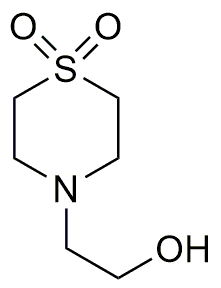4-(2-Hydroxyethyl)thiomorpholine 1,1-dioxide is widely utilized in research focused on:
- Pharmaceutical Development: This compound serves as a key intermediate in the synthesis of various pharmaceuticals, particularly those targeting neurological disorders, enhancing drug efficacy and bioavailability.
- Cosmetic Formulations: It is incorporated into skincare products for its moisturizing properties, helping to improve skin hydration and texture, making it a popular choice in the beauty industry.
- Agricultural Chemicals: The compound is used in the formulation of agrochemicals, providing effective solutions for pest control while being less harmful to beneficial insects compared to traditional pesticides.
- Polymer Additives: It acts as a stabilizer in polymer production, enhancing the durability and performance of materials used in various applications, from packaging to automotive parts.
- Analytical Chemistry: This chemical is employed as a reagent in analytical techniques, aiding in the detection and quantification of other compounds, which is crucial for quality control in laboratories.
Informations générales
Propriétés
Sécurité et réglementation
Applications
4-(2-Hydroxyethyl)thiomorpholine 1,1-dioxide is widely utilized in research focused on:
- Pharmaceutical Development: This compound serves as a key intermediate in the synthesis of various pharmaceuticals, particularly those targeting neurological disorders, enhancing drug efficacy and bioavailability.
- Cosmetic Formulations: It is incorporated into skincare products for its moisturizing properties, helping to improve skin hydration and texture, making it a popular choice in the beauty industry.
- Agricultural Chemicals: The compound is used in the formulation of agrochemicals, providing effective solutions for pest control while being less harmful to beneficial insects compared to traditional pesticides.
- Polymer Additives: It acts as a stabilizer in polymer production, enhancing the durability and performance of materials used in various applications, from packaging to automotive parts.
- Analytical Chemistry: This chemical is employed as a reagent in analytical techniques, aiding in the detection and quantification of other compounds, which is crucial for quality control in laboratories.
Documents
Fiches de données de sécurité (FDS)
La FDS fournit des informations de sécurité complètes sur la manipulation, le stockage et l’élimination du produit.
Spécifications du produit (PS)
Le PS fournit une description complète des propriétés du produit, notamment sa composition chimique, son état physique, sa pureté et les exigences de stockage. Il détaille également les plages de qualité acceptables et les applications prévues du produit.
Certificats d'analyse (COA)
Recherchez des certificats d'analyse (COA) en saisissant le numéro de lot du produit. Les numéros de lot et de lot se trouvent sur l'étiquette d'un produit, après les mots « Lot » ou « Lot de fabrication ».
Numéro de catalogue
Numéro de lot/série
Certificats d'origine (COO)
Ce certificat d'exploitation confirme le pays dans lequel le produit a été fabriqué, et détaille également les matériaux et composants utilisés et s'il est issu de sources naturelles, synthétiques ou autres sources spécifiques. Ce certificat peut être requis pour les douanes, le commerce et la conformité réglementaire.
Numéro de catalogue
Numéro de lot/série
Fiches de données de sécurité (FDS)
La FDS fournit des informations de sécurité complètes sur la manipulation, le stockage et l’élimination du produit.
DownloadSpécifications du produit (PS)
Le PS fournit une description complète des propriétés du produit, notamment sa composition chimique, son état physique, sa pureté et les exigences de stockage. Il détaille également les plages de qualité acceptables et les applications prévues du produit.
DownloadCertificats d'analyse (COA)
Recherchez des certificats d'analyse (COA) en saisissant le numéro de lot du produit. Les numéros de lot et de lot se trouvent sur l'étiquette d'un produit, après les mots « Lot » ou « Lot de fabrication ».
Numéro de catalogue
Numéro de lot/série
Certificats d'origine (COO)
Ce certificat d'exploitation confirme le pays dans lequel le produit a été fabriqué, et détaille également les matériaux et composants utilisés et s'il est issu de sources naturelles, synthétiques ou autres sources spécifiques. Ce certificat peut être requis pour les douanes, le commerce et la conformité réglementaire.


